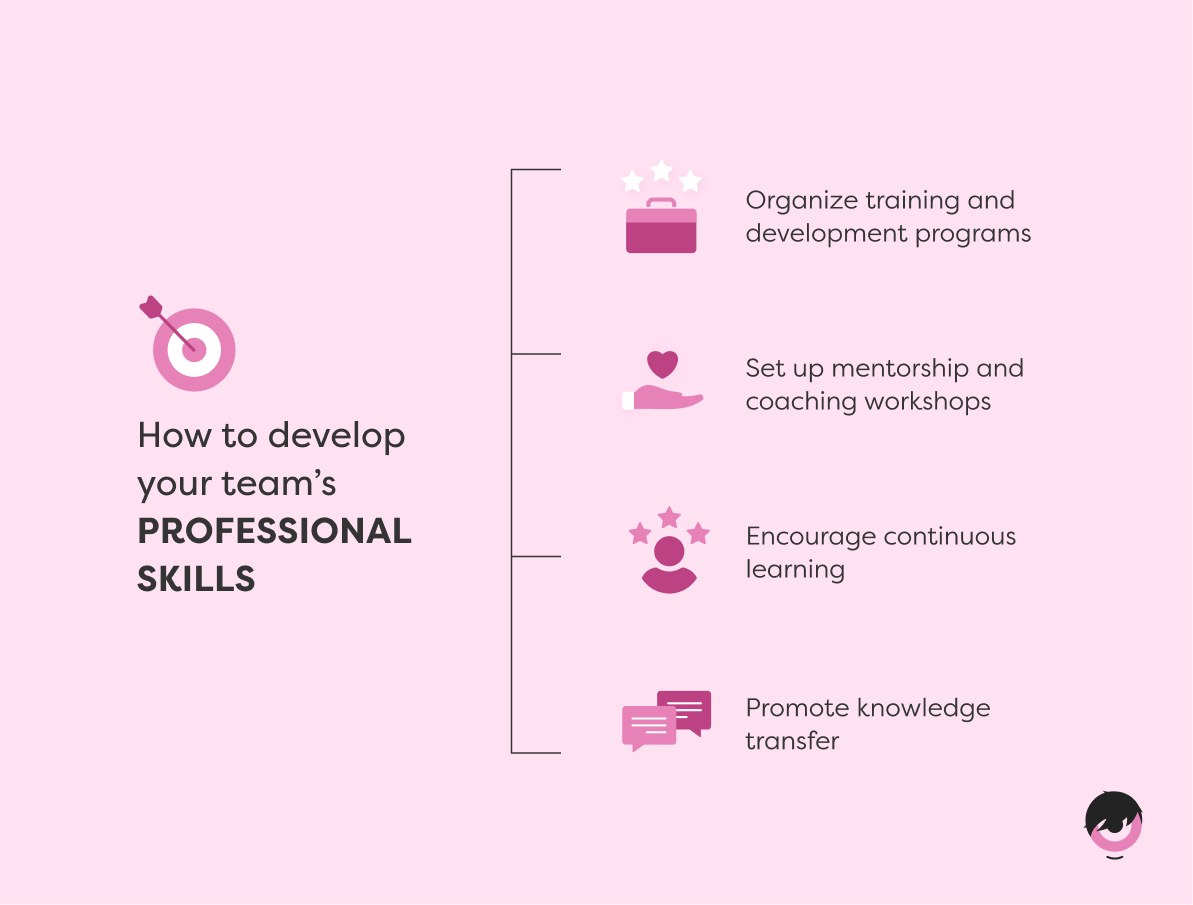No matter what job your job is, we all strive to surround ourselves with talented colleagues and to improve our own skill sets in an increasingly competitive job market. Professional skills are especially important for employers; after all, they are crucial for creating productive teams and ensuring an organization’s innovation and sustainability.
In this article, we discuss professional skills types and the best ways to evaluate and develop them within your company. But first…
What Is a Professional Skill?
A professional skill is an ability used to fulfill a role and complete tasks in a professional context. It can be a technical skill or a behavioral skill.
It differs from personal skills, which impact an individual’s private life more than their professional life, though some abilities overlap (an employee might have critical thinking skills that they use both in their daily life and in completing work tasks).
Types of Professional Skills
Here is a brief list of professional skills by category:
- Theoretical knowledge: these are acquired through educational or personal journeys, learning courses, or intellectual curiosity. This category can include, for example, knowledge of a foreign language.
- Hard skills: these refer to specific, measurable, and tangible job-related technical skills. They can include computer, technological, or creative skills that can be clearly evaluated by a recruiter during an interview or by a manager in daily work or performance reviews.
- Soft skills: they are behavioral and relational skills often related to emotional and social aspects. Team spirit, the ability to give and receive feedback, and problem-solving abilities are examples of essential soft skills to be an indispensable team player.
- Industrial skills: these skills are related to industry-specific knowledge and past or current professional experiences.
Methods for Evaluating Professional Skills
Good news: your team already has a range of professional skills that you can leverage. Unfortunately, due to a lack of analysis and evaluation, these abilities often go unnoticed by managers.
Here are the best methods for evaluating skills within your team:
Key Performance Indicators (KPIs)
Key Performance Indicators (KPIs) are essential for assessing an employee’s productivity and skills. They allow for evaluating an employee’s output and critical qualities like meeting project deadlines and punctuality.
Employee Performance Reviews
Performance reviews come in various forms (traditional, 360-degree, 3.0, etc.). Whatever the method you choose, it’s essential to implement effective performance appraisals in your organization. These reviews provide an opportunity to share constructive feedback and is crucial for your employees’ professional development, as well as to evaluate their skills and address any skills gaps.
Self-Appraisals
Self-assessments encourage employees to share skills they possess but haven’t yet applied in their professional role. They can also identify skills they lack and highlight training or development opportunities that could support their career growth and improve their overall performance.
Peer Reviews (360-Degree Feedback)
Direct colleagues are often well-positioned to assess an employee’s professional skills and identify their strengths and weaknesses. Ask them to detail their coworkers’ skills and describe how they contribute to team success. This will help you get a comprehensive view of skills within your team. This evaluation method also guides your knowledge transfer strategies.
How to Develop Your Team’s Professional Skills
Organize Training and Development Programs
Professional training, whether it is happening in a traditional setting (training sessions, workshops), in a synchronous or asynchronous fashion (online courses, using a skills development platform), is essential to promote skill acquisition within your team.
Remember to communicate with your team beforehand to determine what format would best suit your training and development programs. This will help ensure the continuous efficiency of your operations and increased employee satisfaction.
Afterward, you can evaluate the effectiveness of your training strategies by tracking metrics, assessing your team in individual meetings, or monitoring their progress on a daily basis.
Don’t forget to ask employees if the development opportunities were beneficial and if they enjoyed the experience!

Set Up Mentorship and Coaching Workshops
You can designate a mentor or take on a coaching role with the employee whose skills you want to develop. The advantage of this individual approach is its adaptability to each of your team members’ needs. Mentoring strategies are particularly useful for developing key skills and providing access to promotions for higher-responsibility positions. Using Qooper mentoring software can streamline this process by matching mentors and mentees, tracking progress, and providing structured guidance for skill development.
Encourage Continuous Learning
Skill acquisition also happens continuously: provide your employees with the resources and tools they need to learn and develop a little each day. Don’t forget to give them the necessary time to incorporate their ongoing learning in their work schedule, and organize individual meetings to assess their progress.
Continuous learning can also become an integral part of your company policy (for example, by designating a number of monthly hours dedicated to training) to extend this practice organization-wide and ensure it is understood and implemented by everyone.
Promote Knowledge Transfer
Knowledge transfer is an essential strategy for bridging skill gaps and retaining key knowledge within your organization. By ensuring that no one holds exclusive expertise in the company, you secure your productivity and operations in case of prolonged absence or employee departure.
For effective knowledge transfer, you can organize Lunch & Learns or weekly meetings where each team member shares their experience and tips.
Focus on Remote Team Development
Unfortunately, remote employees are often the most overlooked in training and development programs. However, good practices exist to ensure fair and adequate support for all team members. For effective remote training, prioritize individual follow-up meetings and rely on LMS (Learning Management Systems) to visualize your team’s progress, even from afar.
Although professional skill development involves costs that may deter some companies, it is important to remember that it is a long-term investment that supports your organization’s sustainability and innovation. Plus, it boosts employee engagement and productivity!
Are you facing challenges implementing and tracking your training programs? With Folks HR, you can track hours and budgets dedicated to employee training and analyze employee’s career path with just a few clicks. Request your free demo to learn more!
Track employee performance and skill development on a single platform:
Folks centralizes all your HR management processes for more productive teams!

